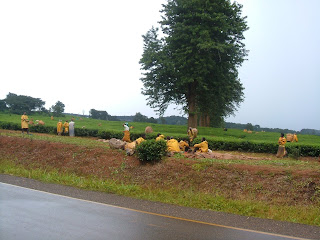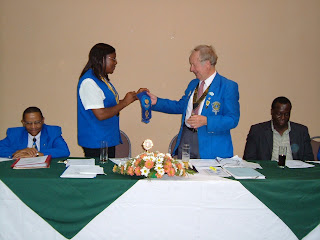




Considering all these bad things that you hear about Malawi
Have you ever wondered whether there is anything good that comes from Malawi and spreads to the neighbouring countries?
When I received an email in June 2007 from an International Eye Organisation that my name had been suggested as one of the team members that would be useful in setting up a new Eye care programme in the rural part of Mozambique; a few thoughts came into my mind. Firstly I wondered whether the current eye service delivery in Malawi would be a model for Mozambique (in the context of so many things still not being efficient in the Malawi programme) and why my name was given and who gave it. If they wanted a neighbouring country ,Why did they not look for a consultant in South Africa where there is so much expertise, I wondered ? The only plausible explanation I had at that time for being chosen for the job was that this was not a very interesting and well paying assignment (imagine spending two weeks in rural Mozambique where the main language is Portuguese and not English).Anyway somebody had to do this job so I wrote back that I would be interested to go.
Arrangements were made to meet Mozambican counterparts in Nampura Province at the Provincial hospital. I did not know what to expect when I arrived in Nampura .A language translator had been organised to be part of the team. I had my digital camera to record all the adventures
Interestingly there was so much fun when I got there and there were not many obstacles as I had anticipated. I observed that Eye diseases do not respect the political boundaries and do not need a VISA to cross borders so every other eye condition that I have seen in Malawi was there in Nampura. Unfortunately Nampura did not have an effective eye programme in place so the problems were much worse there (lots and lots of blind people) . However their villages,districts ,and health services were so similar to Malawi that more than often I forgot I was miles away from Malawi. Getting to the famous Nacala City (where the port is and the Nacala corridor -which the Malawi defence forces had been defending for years ) I expected to see a lot of unusual things. But all I met were nice friendly people and some of their food was the same as we have in Malawi (Nsima). It was during the meeting that we had at the District administrators offices that it transpired to me that these people had heard of so much good eye work that was being done in Malawi and were wondering why the same thing couldn’t happen to them and were hoping I was the solution.
A report about how a programme could be started in the Nampura province was submitted to the NGO a few weeks later and fortunately most of our recommendations were taken seriously such that the programme has actually started.
Looking back ,it would have been a difficulty assignment if a consultant from a well developed country who is not used to working in the community could have been chosen.And somebody,somwhere knew that this assignment could better be tackled by eye workers in Malawi.
The little good things that are happening in the eye sector in Malawi are being watched by many; and in this competitive world it is a rare opportunity for Malawi to spray its wings to the neighbouring countries and become a role model.
















































